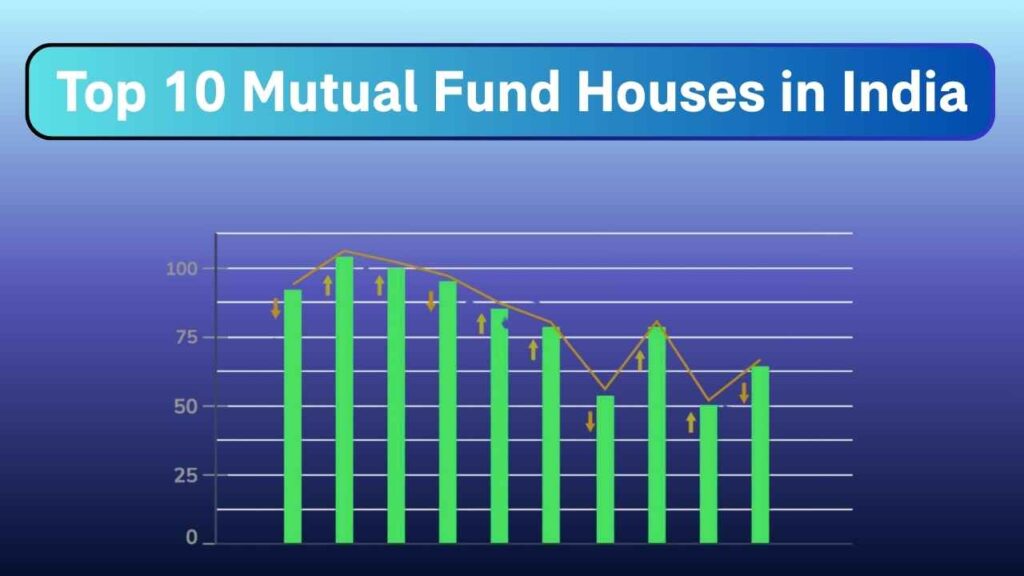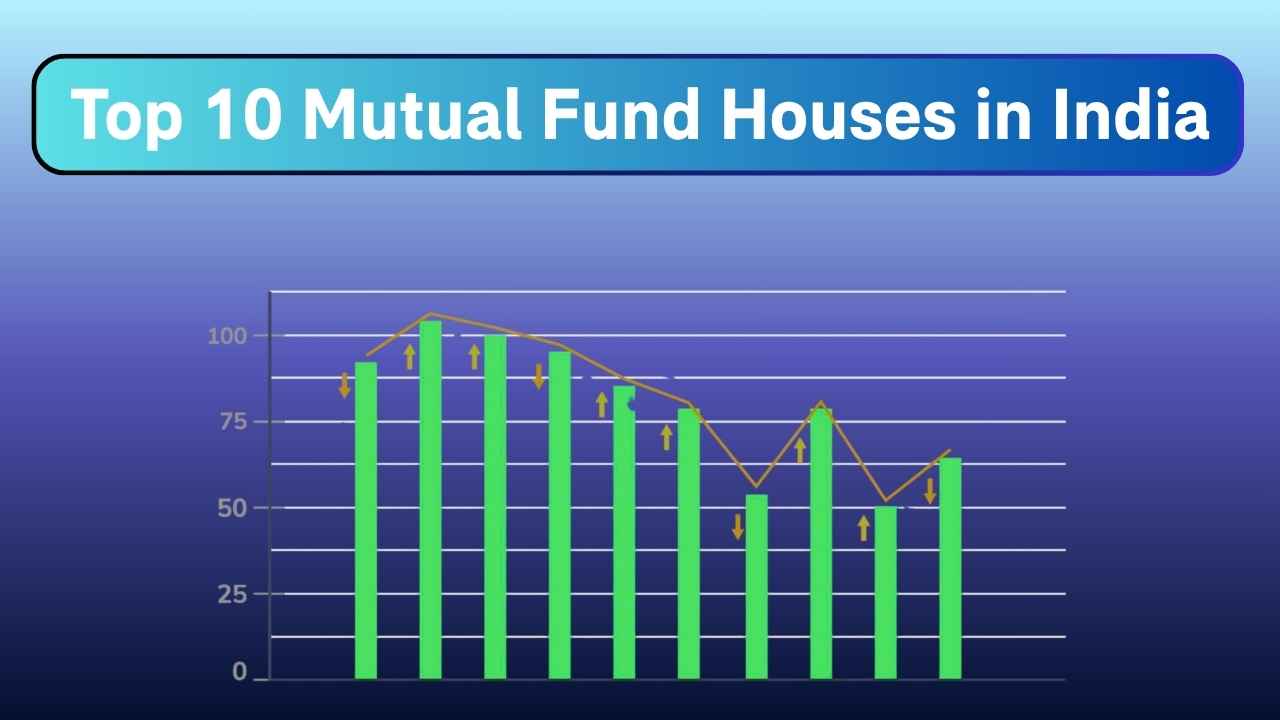Investing in mutual funds is a wise option for growing your money over time. Mutual funds take money from lots of people and invest it in a variety of stocks, bonds, and other securities.
In India, mutual funds are regulated by the Securities and Exchange Board of India (SEBI) to protect investors. With so many houses offering mutual funds, it is difficult to select the proper one. In this article, we will consider the top 10 mutual fund houses in India, discuss their history, and assist you in choosing which one could be right for you.
Top 10 Mutual Fund Houses in India
Here is a quick list of the leading mutual fund houses in India:
- SBI Mutual Fund
- ICICI Prudential Mutual Fund
- HDFC Mutual Fund
- Kotak Mahindra Mutual Fund
- Nippon India Mutual Fund
- Aditya Birla Sun Life Mutual Fund
- UTI Mutual Fund
- Axis Mutual Fund
- IDFC Mutual Fund
- DSP Mutual Fund
Best Mutual Fund Houses in India

1. SBI Mutual Fund
SBI Mutual Fund commenced on June 29, 1987, and was constituted as a company in February 1992. It was the second fund house of India after the Unit Trust of India. SBI MF oversees a sizeable amount of assets through domestic schemes, alternate investment funds, and overseas funds. It has, over the years, established a good track record of consistent returns and a broad range of schemes.
2. ICICI Prudential Mutual Fund
Established in 1993, ICICI Prudential Mutual Fund is one of India’s oldest and largest asset management companies (AMCs). It is a joint venture between ICICI Bank and UK’s Prudential Plc. The partnership unites robust local acumen with international investment practices. A large number of investors have faith in ICICI Prudential due to its stable performance and range of fund offerings.
3. HDFC Mutual Fund
Established in 1999, HDFC Mutual Fund is placed third in terms of assets under management. It listed in August 2018, making it easier for investors to have an overview. HDFC MF is famous for its value‑creating returns that made it a favorite among investors who look for growth and wealth creation in the long term.
4. Kotak Mahindra Mutual Fund
Kotak Mahindra AMC commenced operations in December 1998. It is India’s first AMC to introduce a specialized gilt fund for government securities. As a part of Kotak Mahindra Bank, it has the backing of robust banking expertise and an emphasis on secure, income-focused investments as a complement to equity schemes.
5. Nippon India Mutual Fund
Previously known as Reliance Mutual Fund, the name was changed to Nippon India Mutual Fund on 28th September 2019. The Japanese Nippon Life Insurance owns 75% stake now, and it is the largest foreign-owned AMC in India. Registered with SEBI since 1995, Nippon India MF is well-known for its extensive research and global best practices.
6. Aditya Birla Sun Life Mutual Fund
Incorporated in 1994, Aditya Birla Sun Life MF is a joint enterprise of Aditya Birla Capital Ltd. and Sun Life AMC Investments of Canada. Investors prefer Aditya Birla Sun Life MF for the balance between growth and protection. It has developed strong proficiency in both debt and equity funds over the years.
7. UTI Mutual Fund
UTI MF was formed in 2003 when the original Unit Trust of India (UTI) was demerged into SUUTI and UTI Mutual Fund. Being one of the oldest fund houses, UTI MF has a rich experience of providing satisfactory returns. Investors who believe in tested schemes tend to go to UTI MF.
8. Axis Mutual Fund
Axis AMC started in October 2009 with the support of Axis Bank and Schroder Singapore Holdings. Axis MF is renowned for its pioneering equity and debt schemes. It provides a broad spectrum of investment opportunities that cater to both young and seasoned investors.
9. IDFC Mutual Fund
Started in 2000, IDFC Mutual Fund is promoted by IDFC Ltd., which is well known in the infrastructure finance and advisory space. IDFC MF tries to invest regularly in equity and debt in a disciplined manner. Its funds pursue stable growth by adopting a disciplined investment process.
10. DSP Mutual Fund
DSP Mutual Fund was previously branded as DSP BlackRock MF when it was a joint venture between DSP and BlackRock between the years 2008 and 2018. Previously, it collaborated with Merrill Lynch in 1996 as DSP Merrill Lynch Asset Management. Currently, DSP MF is renowned for its active equity and hybrid schemes, supported by decades of experience.
Factors to Consider Before Choosing a Mutual Fund House
Investing in mutual funds is not just about picking a top brand. Before you invest, think about these factors:
- Performance History
Look at how the fund house and its schemes have performed over the last few years. Consistent returns show steady management. - Asset Size
A large asset base can mean stability. But also compare returns relative to size—big does not always mean better. - Fund Management
Research the experience and style of the fund managers. Their decisions drive your returns. - Expense Ratios
Lower fees mean more of your money stays invested. High costs can eat into profits over time. - Investment Style
Some houses focus on growth funds, others on value or income. Pick one that matches your goal. - Market Reputation
Check ratings by experts and read investor reviews. A good reputation often signals reliability. - Investor Services
Good customer support and easy online access make investing simpler and faster. - Investment Options
Ensure the AMC offers the types of funds you need—equity, debt, balanced, or international.
Conclusion
Selecting the correct mutual fund house is the first step towards achieving your financial objectives. Every one of the top 10 mutual fund houses in India has something unique to offer—whether it is robust banking back-up, worldwide experience, or a historical track record.
By weighing parameters such as past performance, charges, fund managers, and customer support, you can select a house that suits your taste. Never forget to do your homework and think of consulting a financial advisor prior to investing.
Disclaimer:
The information provided in this blog post is for educational and informational purposes only and should not be construed as financial or investment advice. Mutual fund investments are subject to market risks, and past performance does not guarantee future results. You should carefully consider your investment objectives, risk tolerance, and personal financial situation before investing. Always read the scheme information document (SID) and key information memorandum (KIM) of the mutual fund carefully. Consult a qualified financial advisor or tax professional to understand the suitability of any investment and the tax implications associated with it. The author and publisher of this blog assume no responsibility for any losses or damages resulting from decisions made based on the information contained herein.











